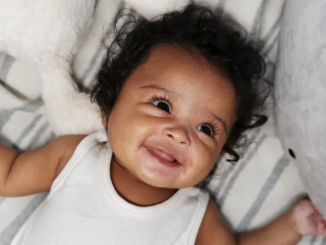
It’s a no-brainer that sleep is vital for one’s health. That is why so many researchers study the best way to get good quality shut-eye. However, forget chamomile tea and meditating before bed. According to new research, women sleep better next to dogs. That’s right; Canisius College in New York State conducted a study that found that canines make better-sleeping partners than humans or cats.
“We found that women commonly rate dogs as better bed partners than cats and human partners and report that their dogs enhance their sleep quality,” Christy Hoffman, Ph.D., animal behaviorist and lead researcher of the study.
Research Finds that Women Sleep Better Next to Dogs
Hoffman surveyed almost one thousand women living in the United States to come to these findings. The results showed that 55% of the participants shared their bed with at least one dog and 31% with at least one cat. Also, 57% of these women shared a bed with a human partner, while the rest did not. [1]
Hoffman also discovered why dogs seemed to make the best bed companions. The first reason is that dogs’ sleeping patterns, as opposed to cats, more closely resemble those of humans.
“The difference between dogs and cats is not surprising because dogs’ major sleep periods tend to coincide more closely with humans’ than do cats,’” said Hoffman.
However, while there may be benefits of these similar sleeping patterns, more research is needed to know for certain. But Hoffman has some ideas of how this could work.
“In comparison to human bed partners, dogs may be better at accommodating their human’s sleep schedule,” she said. “It’s not uncommon for human bed partners to go to bed at very different times and wake up at very different times. Such differences in partners’ schedules can certainly disrupt sleep. It may be that dog bed partners adapt more readily to their owner’s schedule than do human bed partners.”
Moreover, dogs require certain schedules and responsibilities, such as a morning walk. This kind of regime helps their owners maintain a routine, improving sleep quality as a result.
Stillness and Security
Additionally, dogs tend to stay stiff as they sleep. Anyone who’s slept with a fidgety partner knows how disruptive they could be. However, women in the study reported that their dogs stayed on the bed most of the night instead of felines, who tended to come and go.
“This suggests that cats may be more likely than dogs to create disruptions by moving on and off the bed during the night. In addition, we found that dog owners kept to more consistent bedtime and wake time schedules than cat owners and also tended to go to bed earlier and wake up earlier than cat owners,” Hoffman said.
Here’s the third and most important reason: Canines provide a sense of security to their owners. More so than with cats or even human partners.
“Some dog owners may take comfort in the thought that their dog will alert them in the case of an intruder or other type of emergency; furthermore, a dog’s bark may deter a potential intruder. A cat is less likely to take on this role, and so, may not provide psychological comfort in the same way a dog might,” said Hoffman.
The Best Partner for Quality Sleep
However, while the study suggests that dogs are the perfect slumber buddies, their benefits are subjective to each case. For example, a dog could snore or make the bed too hot. Additionally, there are many owners who find that their cats help them sleep.
Keep in mind that the research was based on how the volunteers perceive their pets’ effects on their sleeping quality and duration. As a result, more objective research is needed to definitively consider dogs the superior sleeping partners. However, Hoffman believes that these studies could be beneficial as many American households have pets.
“It will be valuable to continue this line of research so we can develop a clearer picture of the contexts under which pets and their presence in their owner’s bed may positively impact sleep quality, and the contexts under which co-sleeping with a pet may be detrimental to one’s sleep quality,” she said.
For instance, research has also shown that women sleep better while alone than with a human, but many believe in the opposite. Future research could use Fitbit-like devices to objectively track the sleep quality of people in different sleeping conditions.
Never heard of this before
It’s not uncommon for parents to be puzzled when their child mentions unusual sensations after eating a particular food. For instance, when a 6-year-old says their tongue feels itchy after eating strawberries, it can raise concerns and curiosity. While many people enjoy strawberries without any issues, some individuals, especially children, may experience discomfort. In this article, we explore why strawberries might cause an itchy sensation in the mouth and what it means for your child’s health.
The Science Behind Strawberry Reactions

When your child’s tongue itches after eating strawberries, it’s often linked to a condition known as Oral Allergy Syndrome (OAS). This occurs when the immune system mistakenly recognizes certain proteins in fruits and vegetables as harmful, similar to pollen allergens. The proteins in strawberries can trigger a mild allergic reaction in some individuals, causing symptoms like itching or tingling in the mouth, lips, or throat.
What is Oral Allergy Syndrome (OAS)?
Oral Allergy Syndrome typically manifests as itching, tingling, or swelling in the mouth, lips, tongue, or throat immediately after consuming raw fruits or vegetables. It is generally a mild and short-lived reaction, with symptoms often subsiding once the food is swallowed or removed from the mouth. However, it’s essential to monitor for signs of more severe reactions such as difficulty breathing, swallowing, or increased swelling, which may indicate a more serious allergy.
Why Are Children More Susceptible?
Children are more susceptible to Oral Allergy Syndrome due to their developing immune systems. Since their bodies are still learning to differentiate between harmful and harmless substances, they might have stronger reactions to certain foods. Additionally, children are exposed to a variety of new foods, which increases the likelihood of encountering one that triggers a reaction. This makes it especially important for parents to be aware of any unusual symptoms and react accordingly.
Video : Food Allergy vs. Oral Allergy Syndrome
The Role of Pollen-Fruit Cross-Reactivity
A crucial factor in Oral Allergy Syndrome is pollen-fruit cross-reactivity. Many fruits, including strawberries, share protein structures that resemble those of certain pollens. For instance, people allergic to birch pollen may react to strawberries because the proteins in both are quite similar. This phenomenon causes the immune system to mistakenly recognize the fruit as pollen, triggering the allergic response, including the itchy sensation in the mouth.
How Do Strawberries Trigger Oral Allergy Syndrome?
Strawberries contain proteins that mimic pollen allergens, especially in individuals who already suffer from pollen allergies. When these proteins come into contact with the oral mucosa (the tissue inside the mouth), the body’s immune system activates, leading to the symptoms associated with Oral Allergy Syndrome. Interestingly, cooking or processing strawberries often alters these proteins, reducing the chances of a reaction. Therefore, cooked strawberries may be less likely to trigger an allergic response compared to raw ones.
Allergies vs Sensitivities: What’s the Difference?
It’s important to distinguish between a true food allergy and a food sensitivity or intolerance. While Oral Allergy Syndrome is a mild form of allergy, it is not as severe as other food allergies that could lead to anaphylaxis (a severe, potentially life-threatening reaction). Sensitivities, on the other hand, don’t involve the immune system and usually result in digestive issues rather than oral symptoms. If you are unsure about the nature of your child’s reaction, consulting with an allergist can provide clarity.

Preventive Measures and Management Strategies
Managing symptoms of Oral Allergy Syndrome doesn’t have to be complicated. Here are a few tips to help prevent and control the reaction:
- Avoid Raw Strawberries: The best way to avoid an itchy tongue after eating strawberries is by skipping the raw ones. Cooking or processing the fruit can denature the proteins responsible for triggering the allergic reaction.
- Use a Food Diary: Keeping a food diary can help identify other foods that may trigger similar reactions. This can also assist in pinpointing when the symptoms are mild or severe, helping you manage your child’s diet better.
- Educate Your Child: Help your child understand their symptoms and avoid eating strawberries or other foods that might cause discomfort. Empowering them with this knowledge can make them more mindful of their food choices.
- Try Antihistamines: If symptoms occur, antihistamines can help alleviate the itching and discomfort. Always consult a healthcare provider before giving medication to your child.
When to Consult a Healthcare Professional
If your child experiences persistent or worsening symptoms, it’s crucial to seek professional advice. If the reaction seems severe or you notice difficulty breathing or swallowing, call emergency services immediately. An allergist can perform specific tests, such as skin prick tests or blood tests, to confirm the presence of allergies and provide guidance on how to manage the condition. If your child has a history of other allergies or asthma, professional guidance becomes even more critical.
Video : Medications to AVOID if allergic to strawberries
Conclusion: Navigating Strawberry Sensitivities with Care
Understanding why strawberries might cause an itchy tongue sensation in some children can help alleviate concerns and guide parents in managing food reactions. While Oral Allergy Syndrome is generally mild and manageable, being proactive and informed about potential triggers is essential. By consulting with healthcare professionals and educating your child, you can confidently navigate these food reactions, ensuring your child’s safety and comfort.
Empowering yourself with this knowledge will help you create an environment where your child can enjoy their meals without the worry of uncomfortable or severe allergic reactions.



Leave a Reply